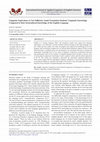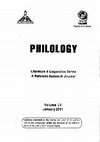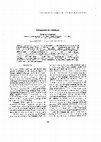Papers by Faisal M Alqahtani

Arab World English Journal, 2020
<p>The current study is motivated by the dearth of studies regarding English translation st... more <p>The current study is motivated by the dearth of studies regarding English translation students' grammatical and sociocultural competencies and their relationship with their Grade Point Averages (GPAs). To fill this gap, this study sought to find if there is a statistically significant relationship between the respondents' GPAs and their levels of grammatical and cultural knowledge. To do this, a multiple-choice test with four sections was developed and validated by experts in the field to examine the respondents' levels of grammatical and sociocultural knowledge. The first two sections examined respondents' knowledge levels of the functions of the key elements of English language tense and aspect (FELTA) and Acceptable Forms of English Language Tense and Aspect (AFELTA). The other two sections examined their knowledge levels of aspects of the culture of American English native speakers (AspCNS) and culturally appropriate American English language use (AppLU). The sample for this study were selected randomly from the department of English Language and Translation at King Saud University. Seventy-five male English translation students from different college levels responded to the questionnaire test. Using descriptive statistics, the responses were coded and analyzed, and thereafter, the respondents' scores on each single section of the test were compared with their GPA scores to determine the statistical significance of differences and correlation. It was found that there was a statistically significant relationship between the GPA scores, the respondents' knowledge of AFELTA, and the knowledge of AppLU. However, no significant relationships were found between the GPA scores and the respondents' knowledge of FELTA or knowledge of AspCNS.</p>

International Journal of Applied Linguistics and English Literature
English as a foreign language (EFL) and translation studies have argued that linguistic equivalen... more English as a foreign language (EFL) and translation studies have argued that linguistic equivalence is not sufficient to transfer intended cultural meanings of the target language (TL) text. Unlike previous studies, this study investigates and compares the knowledge level of the linguistic and sociocultural competencies of selected Saudi translation students (STSs) at King Saud University. A multiple-choice test questionnaire was developed and used to examine the respondents’ knowledge level of two areas of linguistic competence: grammatical functions and grammatical forms of key elements of English language tense and aspect, and two areas of sociocultural competence: knowledge of native speakers’ culture and the cultural dimension of the TL. The results were compared to determine any statistically significant differences. These results suggest that the respondents’ linguistic competence is more developed than their sociocultural competence, and their knowledge of the forms is more ...

Arab World English Journal, 2020
The current study is motivated by the dearth of studies regarding English translation students... more The current study is motivated by the dearth of studies regarding English translation students' grammatical and sociocultural competencies and their relationship with their Grade Point Averages (GPAs). To fill this gap, this study sought to find if there is a statistically significant relationship between the respondents' GPAs and their levels of grammatical and cultural knowledge. To do this, a multiple-choice test with four sections was developed and validated by experts in the field to examine the respondents' levels of grammatical and sociocultural knowledge. The first two sections examined respondents' knowledge levels of the functions of the key elements of English language tense and aspect (FELTA) and Acceptable Forms of English Language Tense and Aspect (AFELTA). The other two sections examined their knowledge levels of aspects of the culture of American English native speakers (AspCNS) and culturally appropriate American English language use (AppLU). The sam...

Intercultural competence (Cross-culture competence) has become the focus of foreign language educ... more Intercultural competence (Cross-culture competence) has become the focus of foreign language education. Awareness of the target culture is now one of the most discussed issues in the literature of the foreign language education. Raising language learners’ intercultural competence has become, now more than ever, an indispensable objective of the EFL education in Saudi Arabia. To investigate this issue, this paper aims at exploring some Saudi EFL learners’ views and attitudes toward learning about the target culture’s practices using both quantitative and qualitative data. Overall, the results showed that Saudi EFL learners were willing to learn about the target culture. Based on the data analysis, this paper concludes with proposing a model for developing language learners’ intercultural competence. The literature of EFL intercultural competence is huge and complex, and it is beyond the scope of this paper to cover all the related issues.

In some parts of the world, acquiring a second language in childhood may be feared and resented f... more In some parts of the world, acquiring a second language in childhood may be feared and resented for its assumed negative consequences. To investigate this issue, this paper compares and contrasts the results from the earlier studies with the results from the later studies on bilingualism in childhood in an attempt to highlight the source of this fear on one hand, and to mitigate the resentment on the other. The literature of bilingualism in childhood, as discussed in this paper, can be characterized as entwined and interdependent. Therefore, this paper focuses only on certain debatable key themes discussed in the literature of bilingualism in childhood; it is beyond the scope of this paper to cover all the issues related to childhood bilingualism. Most importantly, this paper discusses the effect of bilingualism on cognitive development in childhood, and shows why earlier studies have been bluntly rebutted by later studies conducted in the second half of the twentieth century. In general, this paper aims to refute the resentful assumption that acquiring second language can delay children’s cognitive development or can be at the expense of their native language.
Uploads
Papers by Faisal M Alqahtani